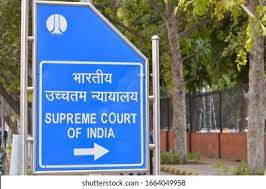Whereby the appellant was held guilty of having committed the murder of his son-in-law, namely, late Markush Borja and sentenced to undergo life imprisonment (Para 2)
The appellant’s wife supported the prosecution’s case to the extent that her son-in-law was killed by the appellant. However, she did not witness the occurrence as she could not enter the house out of fear. The statement of the appellant’s daughter, who is the wife of the deceased (P.W.6), has a direct and material bearing on the fate of this appeal. Hence, we propose to reproduce her statement in extenso, which reads as under (Para 4)
As regards the defence plea taken by the appellant that there was no eye witness to the occurrence and that the alleged confession made by him before his daughter (P.W.6) could not be relied upon, the High Court found no merit in those contentions (Para 10)
The short question that arises for consideration is whether the offence attributed to the appellant falls within the ambit of Exception I of Section 300 IPC which defines “murder”. Exception I reads as follows (Para 12)
The appellant’s motive at best was to prevent the deceased from misbehaving with his daughter after consuming alcohol. The manner in which the occurrence appears to have taken place inside the house, does indicate that the appellant lost his self-control on account of persistent provocation and suddenly thrashed his son-in-law with the bamboo stick. It is a case where provocation seems to be brewing up since the deceased shifted to the appellant’s house. It acquired enormous gravity with each recurrence of humiliating stances of the appellant’s daughter. The fatal occurrence was seemingly the final culmination of loss of the power of self-control. The fact that the deceased was living as a `ghar javai’ with the appellant, sufficiently indicates that the appellant did not have any pre-meditated intention to commit the murder of his son-in-law. But for the continuous harassment of the appellant’s daughter by the deceased who was a habitual drunkard, the appellant would not have lost his senses suddenly. The simmering discontent of a frustrated and hapless father unfortunately led him to strike the deceased with a bamboo stick. The series of provocative acts attributable to the deceased indeed laid the foundation of sustained provocation. (Para 17)
it appears to us that the act of the appellant in causing injuries to the deceased falls within the expression of `culpable homicide’ which does not amount to `murder’. We hold accordingly. The impugned judgments of the Trial Court as well as the High Court are modified to that extent. (Para 18)
The ends of justice would be adequately met by converting the sentence of life imprisonment awarded to the appellant to rigorous imprisonment of ten years. (Para 19)
SUPREME COURT OF INDIA
2023 STPL(Web) 444 SC
[2023 INSC 1015]
Markash Jajara Vs. State Of Assam & Anr.
Criminal appeal no. 3405 of 2023 (Arising out of SLP(Crl.)No.10495 of 2022)-Decided on 3-11-2023
https://stpllaw.in/wp-content/uploads/2023/11/2023-STPLWeb-444-SC.pdf







